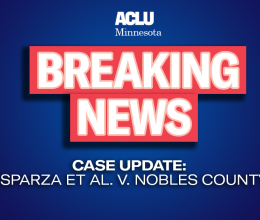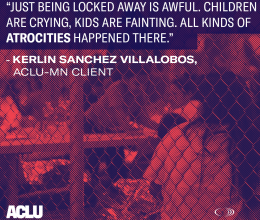By Communications Intern Jenny Portis
The ACLU-MN was in the Minnesota Court of Appeals Thursday, arguing that county sheriffs do not have the authority to detain people for ICE.
In its class-action lawsuit Rodrigo Esparza v. Nobles County, the American Civil Liberties Union of Minnesota argued that Nobles County Sheriff Wilkening routinely held immigrants in jail for ICE, even after he was supposed to release them. That violated their rights to due process, to bail and to be free from unreasonable seizures under our state Constitution.
The ACLU-MN was in court Thursday to preserve a temporary restraining order we had won to stop the practice, which Nobles County challenged. The Minnesota Attorney General has filed an amicus brief siding with the ACLU in support of our TRO.
The main subject of debate before the Court of Appeals’ three-judge panel revolved around the clear distinction between federal and state authority.
Minnesota state law does not grant state officers the authority to detain individuals for federal civil immigration purposes as Sheriff Wilkening did, said attorney Norm Pentelovitch of Anthony Ostlund Baer & Louwagie P.A., who is working with the ACLU on the case. “Federal authority does not expand the authority of the officer,” Pentelovitch said.
The attorney representing the county and sheriff acknowledged that a sheriff on his own cannot take action on an ICE administrative warrant. While the attorney for the county argued that the sheriff has “broad authority” to honor ICE’s warrants, Pentelovitch pointed out that this so-called authority has no relevance because “Civil immigration violation is just that — civil.”
In September of 2018, the ACLU-MN’s Greater Minnesota Racial Justice Project filed Esparza because Sheriff Wilkening was refusing to release immigrants from custody, even after they had posted bond, had their cases dismissed, or completed their sentences. At least a dozen people experienced this unlawful detainment in 2018 — with Maria de Jesus de Pineda being held for 26 days despite paying two different bonds.
A ruling on Esparza v. Nobles County is expected by Sept. 25.



